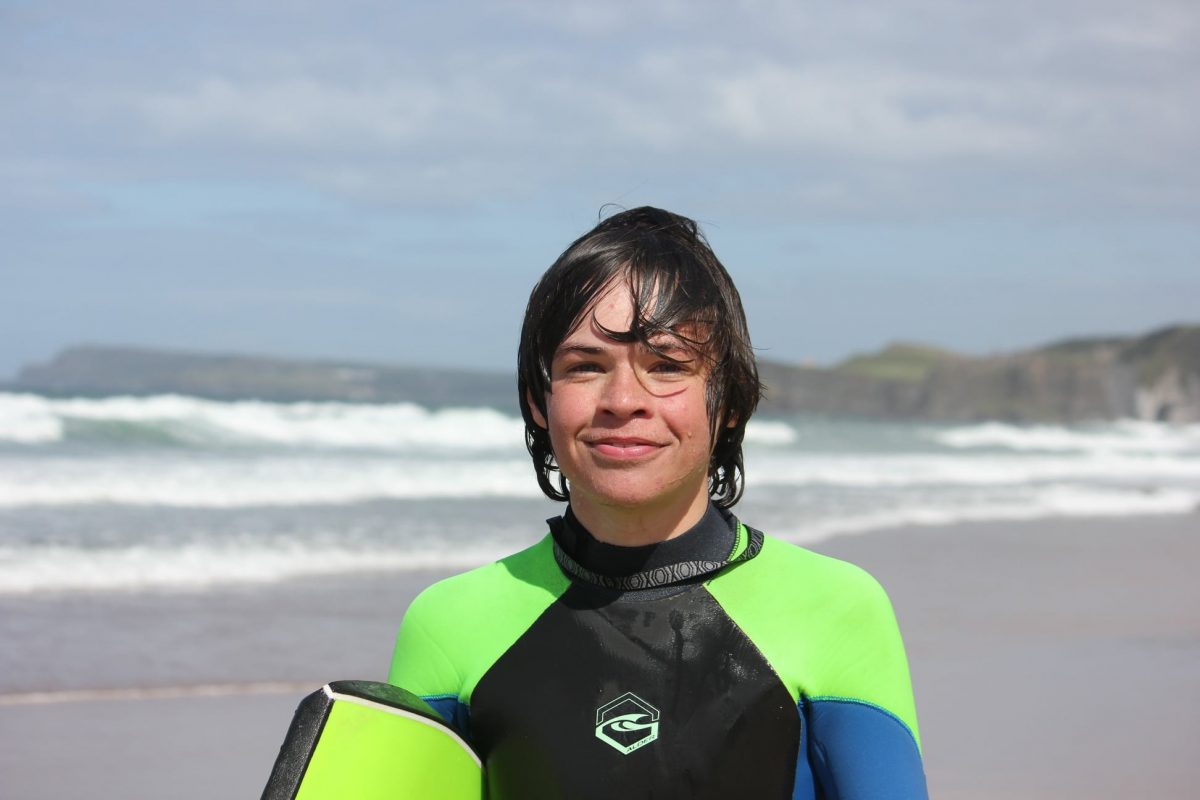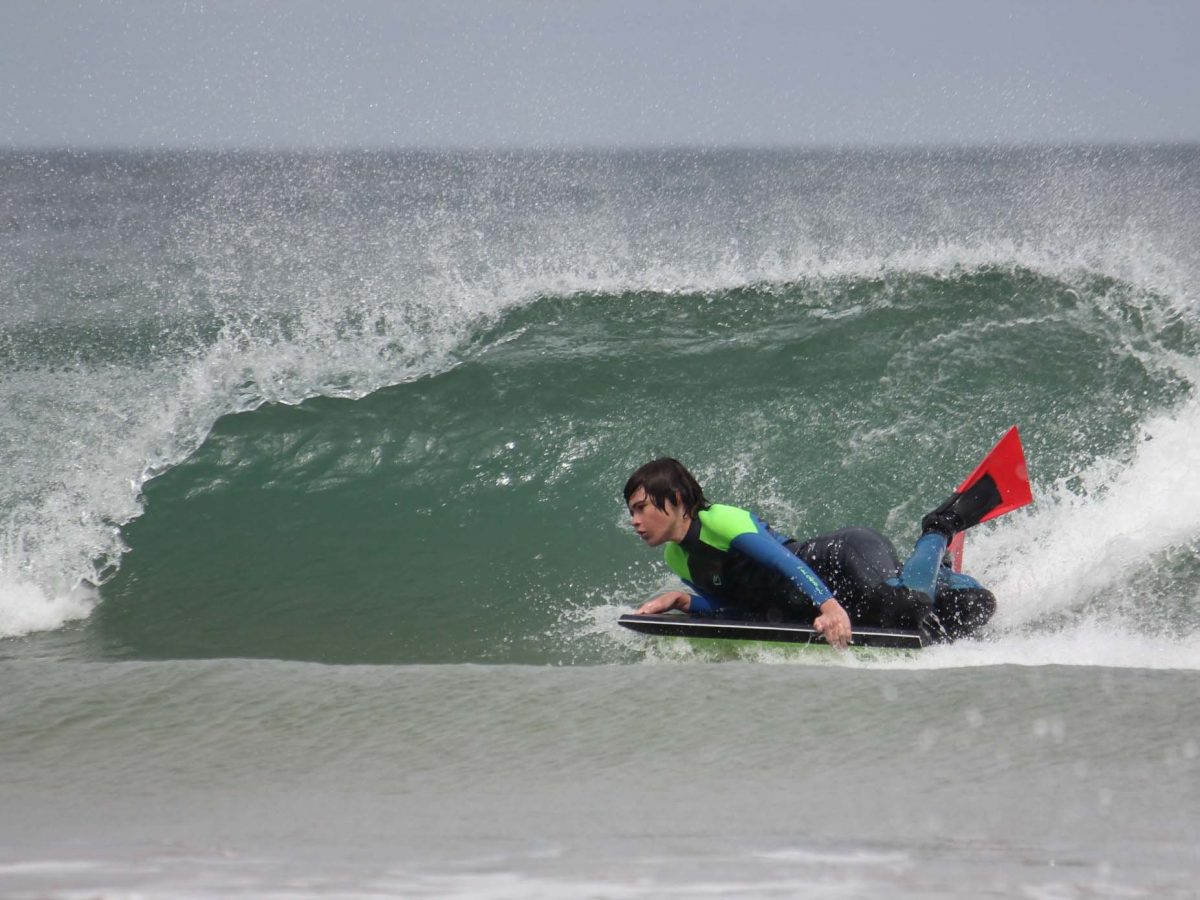Benjamin Griffiths

Night lenses changed my life | Benjamin Griffiths
We caught up with 16-year-old Benjamin Griffiths and his mum, Carolyn. Benjamin, based in Northern Ireland, is a tech-savvy lad with four websites under his belt and a deep passion for surfing. Benjamin, a high myope, had been dealing with rapidly deteriorating eyesight since the age of 8, losing -1.00D of vision every year. By the time he was 13, his eyesight had plummeted to -3.75D and -4.00D. He started using night lenses at the age of 14. Without his glasses, Benjamin’s vision was extremely limited, affecting both his beloved sports and his self-confidence. However, night lenses completely transformed his life, allowing him to surf with ease and enjoy life to the fullest.
Q: So, Benjamin, can you tell us about that first day without anything in your eyes?
A: It was almost surreal, to be honest. I looked out of the window, and it felt like my mind was blown! As we drove to school, I could read the car number plates, which was just awesome.
Q: You’ve had night lenses for a few years now. How has life changed without glasses? And would you ever consider going back to them?
A: I would never go back to glasses in a million years. These lenses have seamlessly integrated into my life. It’s natural to go to sleep and let them work their magic. I don’t even think about it anymore. The idea of wearing glasses during the day feels a bit odd now.
Q: Would you ever think about using daytime lenses now?
A: The concept of putting lenses in my eyes in the morning and then removing them before going surfing feels really strange to me. Right now, I can head to the beach without any worries. I can open my eyes underwater without concern. I don’t have to fret about getting sand in my eyes, which can be a problem for people with contact lenses at the beach. Additionally, if my lens fell out or got damaged at school, I wouldn’t be able to see for the rest of the day. It just doesn’t make sense. Night lenses are easy – they do their job while I’m asleep, and during the day, I have nothing in my eyes. It’s brilliant.
Q: You’re a surfer, right? How has that changed with night lenses?
A: I can actually see the waves now! When I was younger, my dad had to push me onto waves because I couldn’t see them. I learned to surf by feeling the waves rather than seeing them. I couldn’t see the shore or much of what was around me, so it got a bit nerve-wracking when the waves were big and the weather was rough. But now, I can see everything clearly. I love hanging out in the lineup, watching the sea and everything around. Sometimes, I even spot dolphins and seals. It’s my happy place!
Q: What has the adjustment to night lenses been like, including putting them in and taking them out?
A: Initially, it was a bit tricky, but you adapt quickly. It becomes part of your routine. I did worry that I wouldn’t like having them in my eyes or that I’d struggle with putting them in and taking them out, but I got over those concerns pretty quickly.
Q: What did your friends think? Did they notice when your glasses disappeared?
A: Not really. They did notice that something was different about me, though!
Q: Would you recommend night lenses to other teenagers your age and fellow surfers?
A: Absolutely! I would wholeheartedly recommend them. They’re hassle-free, and they’ve made a world of difference for me.

Q: Mum, how did Benjamin end up with night lenses?
A: I was waiting outside his school one day, chatting with another mum who happened to be an optometrist. I was complaining about how many pairs of glasses we had to get for Benjamin – about nine pairs in a year. He managed to break them while playing football and goofing around with friends. She mentioned using night lenses, which I had never heard of. But at that point, I was willing to try anything! I didn’t immediately grasp what they were, but we needed to try something. His eyesight was declining rapidly, and it was quite distressing for us. She mentioned that night lenses could also halt this decline, so we decided to give them a shot. It took him a while to gather the courage to consider putting a lens in his eye, but looking back, the fear was far worse than the reality.
Q: Night lenses are often misunderstood. What has been the reaction of your family and friends?
A: Our family immediately noticed a significant change in Benjamin. He visibly grew in confidence, and everyone was astonished by the transformation. I’m not sure many of his friends and family understand what these lenses are, but I wish more people knew about them because I’m certain some of his friends would benefit from them. When you describe night lenses to people, they almost sound too good to be true.
Q: Why was it important for you as a parent to introduce Benjamin to night lenses?
A: As parents, two things were crucial to us. First, stabilizing his eyesight was a top priority. My eyesight is -13, so I understand how debilitating it is to have very poor vision. When I was young, I was a great swimmer, but I had to give it up, and I no longer swim. I tried goggles, but they didn’t work for me. I loved water sports like water-skiing, but I gave them up as well. The second thing is giving him choice and opportunity. Night lenses have opened up a world of possibilities for Benjamin, and that’s fantastic – giving him choices and opportunities. He won’t have to give up on things due to poor vision or because day lenses or glasses hold him back. Hopefully, for his rugby, this will be the best gift we could give him as parents.
Q: Would you recommend night lenses to other parents?
A: Absolutely! OMG… yes!
